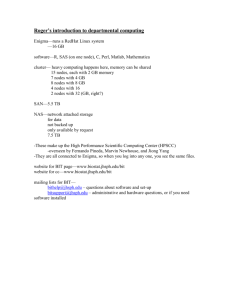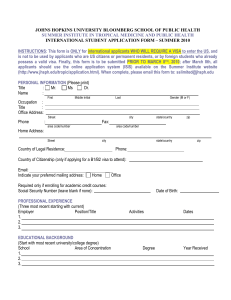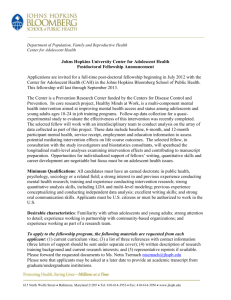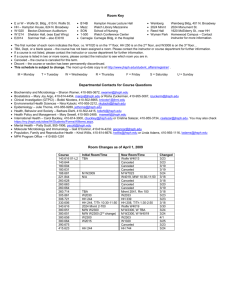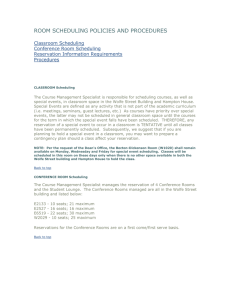Who's Who and What's here at JHMRI
advertisement
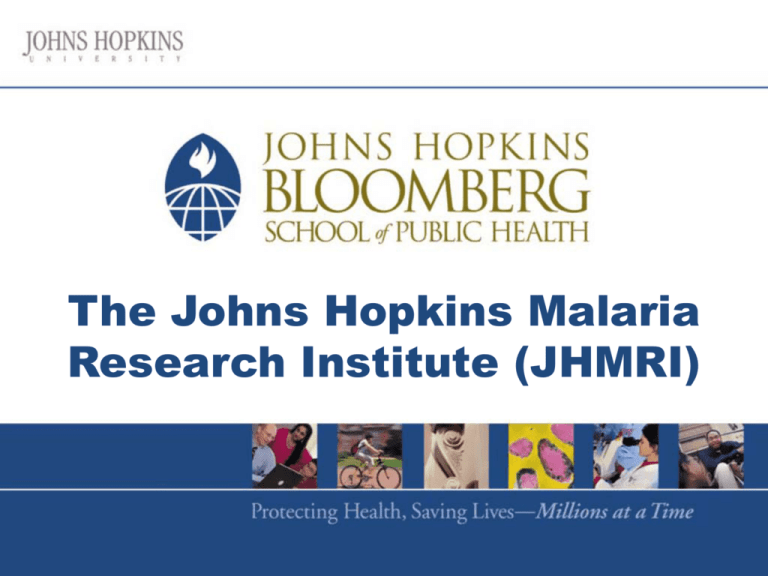
The Johns Hopkins Malaria Research Institute (JHMRI) History and Goals The Johns Hopkins Malaria Research Institute (JHMRI) was created in May, 2001, with funds from an anonymous donor of $100 million, to establish a state-of-the-art research facility to treat and control malaria, develop a vaccine and find new drug targets to prevent and cure this deadly disease. Anonymous Donor 2 Diane Griffin, MD, PhD Founding Director Director and Deputy Directors Director Peter Agre, MD Deputy Directors George Dimopoulos, PhD Fidel Zavala, MD 3 Marcelo Jacobs-Lorena, PhD Photini Sinnis, MD Malaria Researchers affiliated with JHMRI Fidel Zavala Immunology Photini Sinnis Alan Scott Cell Biology Genomics Sungano Mharakurwa Phil Thuma Parasite diagnostics Clinical malaria Passive case detection Isabelle Coppens Jenny Stevenson Plasmodium metabolism Entomology Jelena Levitskaya Douglas Norris Immunology Mosquito biology/ecology Peter Agre Marcelo Jacobs-Lorena Water channel biology Mosquito-parasite interactions David Sullivan Heme metabolism George Dimopoulos Sean Prigge Mosquito innate immunity Co-factor metabolism Rhoel Dinglasan Scott Bailey Transmission-blocking DNA regulation Greg Glass Jürgen Bosch Environmental Surveillance Structure-based drug design Gary Posner Drug compounds 4 Clive Shiff Theresa Shapiro Drug development Myaing Nyunt Drug efficacy Ernesto Freire Parasite inhibitors William Moss David Smith Epidemiology Mathematical modeling Macha Research Trust, Choma, Southern Province, Zambia • Field station in rural Zambia • Access to community • Focus on malaria, but other diseases studied (HIV, TB) • Molecular lab • Insectary • Development of malaria sphere • Operations also include sociologybased research (e.g. perceptions of malaria) • Dr. Phil Thuma, MD Senior Scientific Advisor • Dr. Sungano Mharakurwa, PhD Scientific Director • Dr. Jennifer Stevenson, PhD Lead Entomologist 5 Field sites – Zambia and Zimbabwe, ICEMR project • International Center of Excellence for Malaria Research: – Combined and complimentary studies on: – malaria epidemiology, vector biology and parasite genetics/genomics • 3 sites: Zambia: Choma, south; Nchelenge, north; Zimbabwe: Mutasa, East 6 Core Facilities I. JHMRI Cores • • • • Biophysics Core Environmental Surveillance Core Insectary Core Parasitology Core II. MMI Cores & Facilities • • • • • 7 Genomic Analysis and Sequencing Core Core Microscopy Facility Flow Cytometry and Cell Sorting Becton Dickinson Immune Function Laboratory HIV Clinical and Basic Research Laboratory Biophysics Core • Facility Co-Directors Scott Bailey, PhD Email: scbailey@jhsph.edu Jürgen Bosch, PhD Email: jubosch@jhsph.edu Sean Prigge, PhD Email: sprigge@jhsph.edu Biophysics Core Johns Hopkins Bloomberg School of Public Health 615 N. Wolfe Street, Room W8620 Baltimore, Maryland 21205 Telephone: 443-287-48227 fax: 410-955-0105 8 Biophysics Core The Biophysics Core Facility provides equipment for JHMRI investigators who want to characterize macromolecules or macromolecular complexes using biophysical techniques Isothermal Titration Calorimetry: This technique measures the heat of binding between two molecules, providing a direct measurement of binding affinity. Location: W8620 Biophysics Core Dynamic Light Scattering. This technique provides information about the size, shape and oligomerization state of biomolecules. Location: W8620 Circular Dichroism. This technique measures the overall secondary structure content of proteins and quantifies changes in structure under different conditions. Location: W8620 Biophysics Core X-ray Crystallography. This technique is used to determine the atomic resolution three-dimensional structure of biomolecules and macromolecular complexes. Location: W4317 Environmental Surveillance Core http://gislab.jhu.edu/default.asp • Facility Co-Director Timothy Shields, MA Department of MMI Email: tshields@jhsph.edu • Facility Co-Director Dr. Frank Curriero, PhD, MA Department of EHS Email: fcurrier@jhsph.edu Environmental Surveillance Core Facility Johns Hopkins Bloomberg School of Public Health 615 N. Wolfe Street, Room E3025 Baltimore, Maryland 21205 Telephone: 410-502-9077 fax: 410-955-0105 Overview - Spatial Analysis Spatial Data Obtain, Collect, Create Images (Satellite, Google Earth) Spatial Data Accuracy Non-spatial data GIS* Maps Spatial Database/Integration View Patterns Simultaneously Generate/Refine Hypothesis Spatial Statistics Quantify Relationships Test Hypothesis Study Design Go Beyond the Map! Rationale Identified malaria outcomes and measured environmental determinants likely vary spatially. Collect and harness this information to improve • study design • analysis • prevention, intervention, control and policy efforts *Geographic Information System GIS - Integrate data layers - Spatially link data - Digitizing - Maps - Hypotheses Spatial Statistics - Risk map estimation - Assess clustering - Detect clusters - Identify Env factors for modeling spatial variation - Assess trends over space & time Insectary Core Facility • Facility Director: Marcelo Jacobs-Lorena, PhD Email: mlorena@jhsph.edu • Facility Manager: Christopher Kizito, MS Email: ckizito@jhsph.edu Insectary Core Facility Johns Hopkins Bloomberg School of Public Health 615 N. Wolfe Street, Room W4700 Baltimore, Maryland 21205 Telephone: 443-287-0789 fax: 410-955-0105 16 Insectary Map • Size: 3000 sq ft. divided into two operational areas – High-Containment (Area 2) and LowContainment (Areas 1, 3 & 4). • There are seven procedure rooms and an autoclave. Insectary Core Services • Mosquito rearing: produces 30~40,000 mosquitoes per week (An. gambiae and An. stephensi). Mosquitoes can be ordered by researchers. • Provides space and assistance for rearing of other mosquito species. • Training in insectary use, mosquito rearing, handling and identification techniques. • Mosquito transformation (transgenic mosquitoes) services and training in embryo injections. 18 For new insectary users: • Training required by insectary manager before access is granted • Specialized training required to work with Plasmodium falciparum-infected mosquitoes • Register on the website to place mosquito orders: http://jhmalaria.jhsph.edu/department/insectary/FrameForm.cfm 19 Parasite Core Facility http://www.parasitecore.org/ • Facility Director: George Dimopoulos, PhD, MBA gdimopou@jhsph.edu • Facility Co-Manager: Godfree Mlambo, PhD gmlambo@jhsph.edu • Facility Co-Manager: Abhai K. Tripathi, PhD atripath@jhsph.edu Parasite Core Facility Johns Hopkins Bloomberg School of Public Health 615 N. Wolfe Street, Room W4212 Baltimore, Maryland 21205 Telephone: 410-502-7744 fax: 410-955-0105 Parasite Core Facility LOCATION -TISSUE/CELL/PARASITE CULTURE ROOM -OFFICE AND MOLECULAR LAB ON 5TH FLOOR Parasite Core Facility Major Core Services… P. falciparum Parasite Cultures Asexual Stage (1 week prep time) Gametocyte Stage (3 week prep time) Rings Stage Mosquito Stage Parasites P. falciparum sporozoites (6 weeks prep time) P. berghei and yoelii sporozoites (4 weeks prep time) Trophozoites and Schizonts Drug Sensitivity Assays in vitro antimalarial assays (P. falciparum) in vivo antimalarial assays (rodent model) Gametocytes Training Malaria culture techniques Membrane feeding assay Safe technique for infected mosquito handling Sporozoites Parasite Core Facility Custom Services and Collaboration Opportunities • Generation of Transgenic parasite lines • Transmission blocking assays (sera and compounds) • IFA (Mosquito stages) • Sporozoite slides • High-throughput Anti-malarial assays (SYBR green) • In vivo drug efficacy assays • P. falciparum gametocytocidal assays (96 well plate, fluorescence assay) Genomic Analysis and Sequencing Core Facility http://jhmmi.jhsph.edu/department/gene_array/FrameForm.cfm • Facility Director: Alan Scott, PhD Email: ascott@jhsph.edu • Facility Manager: Anne Jedlicka, MS Email: ajedlick@jhsph.edu Amanda Dziedzic Email: adziedzi@jhsph.edu Genomic Analysis and Sequencing Core Facility Johns Hopkins Bloomberg School of Public Health 615 N. Wolfe Street, Room E4208 Baltimore, Maryland 21205 Telephone: 443-287-5967 fax: 410-955-0105 Core Services • Microarray experiments (Affymetrix, Agilent, NimbleGen) • Next Generation Sequencing (Roche 454, Illumina MiSeq) • Genotyping studies – Microarray-based GWAS, cytogenetics – TaqMan allelic discrimination SNP analysis • Real-Time PCR assays (TaqMan, PCRarray) • DNA and RNA purification and Quality Assessment • Detailed Data Analysis (microarray and genotyping) • Consultation on experimental design, implementation, and/or analysis • Protocol adaptation and development • Instrument and Applications training Next Generation Sequencing • Instruments – Roche 454 GS FLX+ – Roche 454 GS Junior – Illumina MiSeq (JHMI Biological Chemistry Core) • Applications – de novo Genome Sequencing (viruses, bacteria, fungi, parasites…) – Targeted Resequencing (amplicon, Sequence Capture) – Metagenomics (microbiome, mycobiome) – Transcriptome Analysis – Gene regulation (CHIP-seq, etc) – miRNA • Samples – Genomic DNA – PCR products – cDNA – Aptamers Imaging and Microscopy Resource Facility http://jhmmi.jhsph.edu/department/microscope1/FrameForm.cfm • Facility Director: Isabelle Coppens, PhD Email: icoppens@jhsph.edu Imaging and Microscopy Resource Facility Johns Hopkins Bloomberg School of Public Health 615 N. Wolfe Street, Room E2214 Baltimore, Maryland 21205 Telephone: 443-287-1589 fax: 410-955-0105 27 Facility Services The facility provides advanced instrumentation for the digital documentation of everything from macromolecules to cells and tissues • Available Equipment - FujiFilmFLA2000 Fluorescent laser scanning imager - FujiFilmLAS3000 Luminescense imager - Nikon Eclipse E800 upright microscope - Nikon TE200 inverted microscope - Nikon Eclipse90i upright microscope • New Users must first register before gaining access to the facility microscopes 28 Travel Funds JHMRI Matching Travel funds • Matching PI funds up to $600 per academic year for Pre- & Post-docs to give poster/talk at conference • PI approval required before submitting request to Maryann Smith. MMI Travel Funds • 1st & 2nd year MMI students eligible for $750 per academic year • Submit requests to Thom Hitzelberger JH Center for Global Health Travel Funds • Global Health Established Field Placement Awards http://www.hopkinsglobalhealth.org/travel_grants/established_placements/index.html 29 JHMRI Pre- and Post-doctoral Fellowships • Maximum two years support • Eligibility: - in JHMRI laboratory - Pre-docs, PhD candidate & completed all requirements including oral exam • Applications accepted once a year July 1st • Proposals reviewed by Director, Deputy Directors & 2 to 3 JHMRI Faculty Other Funding Opportunities • Barr Research – Vector Research • Bang Award – For students engaged in pathobiology research • Sommer Scholar – 2nd year students applying for 3rd year funding 30 JHMRI Pilot Grants for Faculty • Development of new malaria ideas which lead to future external funding • Maximum support $150,000 over 2 years • Pre-applications accepted on May 1st 31 “Points of Contact” Items related to Dr. Agre: Trish Ward tward@jhsph.edu Room E5143, x78745 Fellowship, Pilot Grant & Listserve: Maryann Smith* mksmith@jhsph.edu Room E5004, x74853 or Genevieve Nixon Williams gnixon@jhsph.edu Room E5141, 44883 *Tropical Medicine Dinner Club & MMI Thurs Seminar Listserves 32 Reimbursements, Access to Copier, Printers & Rooms: Thom Hitzelberger thitzelb@jhsph.edu Room E5132, x53457 Human Resources Questions: Nancy Lance nbiglari@jhsph.edu Room E5132, x74775 Welch Library/PubMed research help: Peggy Gross mgross21@jhmi.edu Room E5640, x27574 (available Tues & Thurs) MMI Internal Website http://jhmmi.jhsph.edu • Department directory • Personnel photos and search features • MMI Equipment, Instruments & scheduling • Events calendar, etc. • Inter-departmental email system - allows mass emailing to department • Access with your JHBSPH email login and password 33 JHMRI Website http://malaria.jhsph.edu/ School plans redesign of MMI & JHMRI websites. Send your suggestions for redesign of JHMRI website to malaria@jhsph.edu 34 Student Research Groups • JHMRI Organizer: Peter Dumoulin Room: W2708 410-502-9134 pdumouli@jhsph.edu •MMI Organizer: Amanda Balaban Room: E4209 443-287-0129 abalaban@jhsph.edu 35 MMI/JHMRI Post-doc Organization Organizers: Daniel Ragheb dragheb@jhsph.edu Room E4209 x70129 Ryan Smith rcsmith@jhsph.edu Room W4008 x70789 • Informal monthly meetings with MMI and MRI post-docs to promote camaraderie within the department – Able to present results, troubleshoot experiments, discuss events in the department and plan social gatherings • MMI Post-doc Summer Seminar Series – Weekly seminar series for post-docs to present their work • JHMRI Post-doc Summer Seminar Series - Friday seminar series for post-docs to present their research 36 For students and post-docs…. • The JHMI Professional Development Office (PDO) -http://www.jhu.edu/~pdo/ • Professional Development Courses – Grant writing (GrantCraft) – Research Leadership – Presentation and Writing Skills • Career Development Center – Career Fairs and job postings – Individual Consultations • Contact info : – Donna Vogel dvogel@jhmi.edu 37
